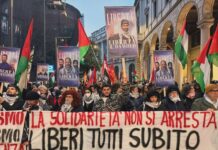
As Palestinian prisoners entered their 16th day of hunger strike, the most severely ill Palestinian prisoners – those held in the Ramle prison clinic, the subject of demands for its replacement – confirmed their participation in the Strike of Freedom and Dignity with a process of escalating protest.
Launched on 17 April, Palestinian Prisoners’ Day, by 1500 Palestinian prisoners in Israeli jails, the strike has a series of demands, including an end to the denial of family visits, appropriate medical care and treatment, the right to access higher education and an end to solitary confinement and administrative detention, imprisonment without charge or trial. Prisoners engaged in the strike have been subjected to a series of repressive measures, including confiscation of personal belongings, frequent repressive night raids, denial of family visits, frequent transfers and denial of legal visits. In particular, the banning of striking prisoners, except for a few held in Ofer and Ashkelon, from legal visits has inhibited external communication with the prisoners about their health and conditions.
The announced program of the prisoners in the Ramla clinic included returning all three meals on 17 April, 24 April, 26 April and 29 April. Moving forward, they are returning all three meals on 1, 3, 6, 8, 10, 13, 15, 17, and 20 May. In the latter two weeks, the sick prisoners will also reject medication to support the broader hunger strike. Prisoners in the Ramle prison clinic are dealing with a number of severe medical conditions, including cancer, heart disease, diabetes, severe injuries and wounds and severe physical disabilities, frequently caused by wounds by Israeli occupation soldiers prior to or at the time of arrest.
Meanwhile, the prisoners of the Popular Front for the Liberation of Palestine announced that they would soon be announcing escalating steps regarding the strike and the struggle inside Israeli prisons, saying that the leadership of the prison organization is conducting extensive internal consultations to announce new steps of action and escalation behind bars for freedom and dignity.
Tomorrow, 3 May, the Israeli Supreme Court will consider a petition from Adalah and the Prisoners’ Affairs Commission demanding that strikers be permitted legal visits; members of the Knesset from Palestinian Arab parties in ’48 Palestine and representatives of human rights organizations are expected to attend the 11:30 am hearing. This comes after lawyers’ demands for an immediate visit with longest-consecutively-held Palestinian prisoner Karim Younes, jailed for nearly 35 years, were rejected by the Haifa District Court.
Throughout Palestine, support for the strikers continued in streets and squares of cities, villages and refugee camps in the West Bank, Gaza Strip, Jerusalem and occupied Palestine ’48. An increasing number of former prisoners joined solidarity strikes in support of the ongoing strike inside prison; in Qalqilya, eight former prisoners are on hunger strike in the prisoner support tent. Palestinian Jerusalemite youth organizer Sumoud Abu Khdeir was reported to be released on Monday evening after she was seized by Israeli occupation forces as she participated in a youth mural event to support the prisoners near Jerusalem’s Damascus Gate. She was ordered to stay away from the area for two weeks and to pay a financial bail of 1000 NIS ($277 USD).
A number of Bir Zeit University students, themselves former prisoners, continued their hunger strike in support of the prisoners. Over 60 students at the university – amid hundreds of imprisoned Palestinian students in total – are held in Israeli jails. Lina Khattab, Jihad Manasra, Yousef Barghouthi, Abed Barbar, Yasser Abu Rmaileh, Osama Sbeih, Mahmoud Muna and Mohammed Badr launched their strike on 30 April to support the prisoners and raise the profile of the strike among students.
Solidarity hunger strikes also continued in the Arab region and internationally. On 2 May, a group of San Diego organizations are organizing a solidarity fast in the Southern California city to support the striking prisoners. Meanwhile, Tunisian students from Gabès have launched a hunger strike in solidarity with the Palestinian prisoners, reported Asra Voice. Former Lebanese prime minister Salim al-Hoss also announced a one-day hunger strike to support Palestinian prisoners.
The students in Tunisia joined students at the University of Manchester, who are on their 5th day of a support strike for the Palestinian prisoners. At the University of Edinburgh, the Communist Society launched a hunger strike on 30 April to support the Palestinian prisoners. “We are merely a few days into what has proved already to be a grueling endeavor- both physically and mentally. Yet for the Palestinian prisoners two weeks into their hunger strike, one can only begin to imagine the torment, yet bravery they are experiencing. Faced with enslavement under the toxicity of Zionism, hundreds of Comrades, from all factions of Palestinian resistance have lit a fuse for the rest of the world when darkness threatens to engulf us. It is a fuse that we believe must be seized upon, and utilised to spark a greater flame,” wrote the Edinburgh strikers.
These actions came as mass marches for 1 May, International Workers’ Day, took to the streets of cities around the world with active participation by Palestinian communities and Palestine solidarity organizations, emphasizing the importance of supporting the Palestinian prisoners’ strike at this critical time. In major global cities, including New York, Dublin, Chicago, Los Angeles, Berlin, Athens, London, Cologne, Wuppertal, Malmo, Paris, Lille, Lyon, Montpellier, Liege, Copenhagen, Lausanne, Oakland and elsewhere, the call of the Palestinian hunger strikers and the Palestinian people resonated on 1 May.
Further protests will take place, in addition to the San Diego event, in Helsinki, Finland and in Athens, Greece, where a large mobilization is planned at 6 pm organized by a wide range of Palestine solidarity and support groups throughout Greece. The mobilization follows a strong presence by many political parties and trade unions in the Athens May First demonstration with strong attention to the Palestinian struggle.
Discover more from Samidoun: Palestinian Prisoner Solidarity Network
Subscribe to get the latest posts sent to your email.




